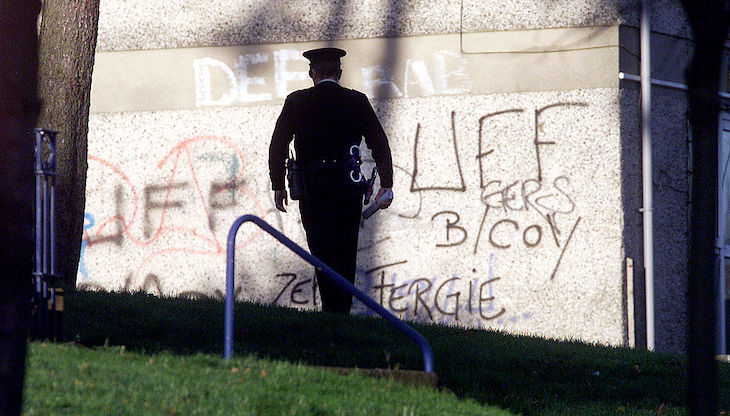For many years, republicans have clamoured for a public inquiry into the murder of Pat Finucane, who was gunned down in front of his wife and children by the loyalist Ulster Defence Association (UDA). This week, they finally got their way: in the House of Commons on Wednesday, Northern Ireland Secretary, Hilary Benn, announced an independent probe into the 1989 killing of the Belfast solicitor who frequently represented IRA men. While his loved ones are no doubt delighted, the relatives of other Troubles’ victims are unhappy that this level of scrutiny will not be applied to the deaths of their family members.
During the ‘Troubles’ in Northern Ireland, at least 3,500 murders were committed
During the ‘Troubles’ in Northern Ireland, at least 3,500 murders were committed; the vast majority remain unsolved. In recent years, though, resources have increasingly been concentrated on the relatively small number of cases where state involvement is alleged. The Finucane murder is one of the most high-profile examples. It has already been investigated by the former Met Police commissioner John Stevens (who found that two agents had been involved in Finucane’s murder), Canadian judge Peter Cory and UN war crimes prosecutor Desmond de Silva, at a cost of more than £20 million.
In 2019, during yet another legal action, the Supreme Court found that these examinations did not meet the standards required by Article 2 of the European Convention on Human Rights. This year, the Appeal Court demanded that the government announce a fresh investigation or set out alternative plans. Thanks to Benn, the Finucane case will now be scrutinised independently under the Inquiries Act 2005.
Justifying his decision, the secretary of state argued that the solicitor’s killing was a ‘unique’ case. ‘This government takes its human rights obligations and its responsibilities to victims and survivors of the Troubles extremely seriously,’ he said.
That may be so, but it is difficult to defend the idea that Finucane deserves such overwhelming scrutiny, when other Troubles’ murders – including those perpetrated by the IRA – have been given comparatively little attention.
In fact, unlike many of those cases, one of the perpetrators has already been convicted of Finucane’s killing. The getaway driver, Ken Barrett, was sentenced to 22 years’ imprisonment in 2004. Thanks to the terms of the Belfast (Good Friday) Agreement he served only two years of that term.
Benn said that previous investigations into Finucane revealed ‘collusion’ by the state, which puts this incident into a privileged category. Security forces have repeatedly been accused of this transgression, or the vaguer ‘collusive behaviours’, during the Troubles, but there is has been disagreement about the precise legal definition of those terms. That ambiguity risks allowing omissions and misjudgments by the police or army to be portrayed as conspiracies or even as directing terror.
The security services certainly infiltrated paramilitary organisations successfully, during the so-called ‘dirty war’ in Northern Ireland. That strategy eventually defeated terrorism and forced the IRA to end its campaign, potentially saving thousands of lives. However, it also required handlers to make hugely complicated moral decisions, as they sought to protect their agents’ identities. This sometimes resulted in preventable crimes being allowed to take place.
De Silva’s report concluded that there was ‘no overarching state conspiracy to murder Pat Finucane’. However he did not exonerate state employees, or clear them of wrongdoing, claiming their conduct was occasionally ‘shocking’.
That finding, and David Cameron’s resulting apology on behalf of the government, was not enough to satisfy nationalist campaigners. Along with the family and Irish ministers, Sinn Fein has continued to press for a full inquiry and the SDLP yesterday demanded similar probes for more cases.
Republicans’ overarching aim is to imply that the security forces, rather than separatist terrorists, were the main perpetrators of the Troubles. Those attempts have been remarkably successful so far, with 69 per cent of nationalist voters in 2022 agreeing with Sinn Fein’s northern leader, Michelle O’Neill, that the IRA’s violence was necessary.
Indeed, Benn’s decision on Finucane could effectively reverse the Conservatives’ belated attempts to balance the so-called legacy process in Northern Ireland and prevent republican ‘lawfare’ from distorting the history of the Troubles.
The Tories’ Legacy Act created an Independent Commission for Reconciliation and Information Recovery, which was intended to provide victims and survivors with answers. If, as Benn claimed, the goal is to provide missing information to the Finucane family, the ICRIR could have fulfilled that task.
By the end of the 1990s, the IRA and other paramilitary groups were ridden with informers and desperate to end a ‘war’ that had failed to achieve their objectives. Those organisations’ prisoners were released without apologising for their crimes and most of their victims were left without any realistic chance of seeing justice.
Rather than defend the men and women who defeated terrorism, successive governments have engaged in self-flagellation over the tactics they employed. The result is that republicans have twisted the story of the Troubles into increasingly unrecognisable shapes, casting themselves as victims and the state as the aggressor.
This inquiry may become the latest, hugely effective weapon in that campaign, while also costing the taxpayer millions of pounds.






Comments